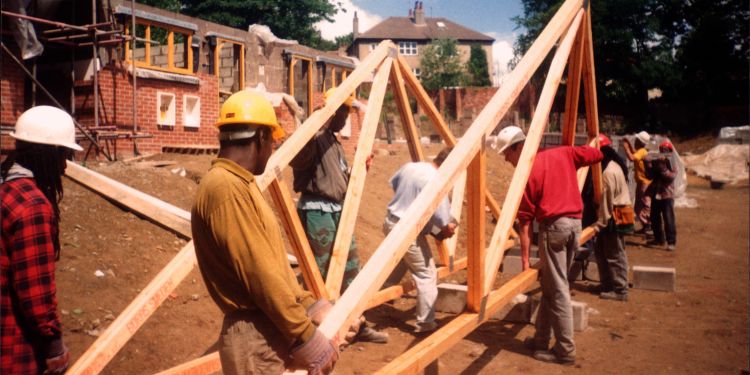Community-led housing’s rich history in Leeds

How can housing work for communities? Neil McKenna explores the history of community-led housing in Leeds to inform and inspire its future.
Neil McKenna is a PhD researcher in the School of Geography. His research explores community-led housing in Leeds.
He has co-authored a paper titled, ‘It is ‘more than just about building houses’: collaborating towards a housing commons in Leeds,’ alongside Professor Paul Chatterton and Dr Andrew Wallace.
Community-led housing describes homes and areas that are collectively designed, built and/or managed by community groups. They are typically affordable, not-for-profit, and collective in some way.
Community-led housing can include house shares, co-operatives, co-housing, community land trusts, self- and custom-build and self-help. They can be purpose-built or be created with existing houses.
By offering an alternative to the mainstream, commodified housing system, community-led housing aims to be accessible and meet its community’s wants and needs. For example, the modern co-operative Lilac focuses on being low-impact and sustainable.
Public interest in community-led housing is high, but the majority isn’t aware of its history or potential, while state, market and third-sector support is inconsistent.
Neil’s research provides a deeper understanding of the practice in Leeds and makes recommendations that support its future.
A history of alternative housing
Exploring the history of community-led housing in Leeds from the 1970s, the paper maps the political and social context onto the different approaches that took place.
“The histories of the different models of community-led housing in Leeds are not well documented, nor understood,” Neil said.
“I wanted to bring the range of local examples together in one place and to try and draw out lessons from the different examples and periods of time. Through this story, the ultimate aim was to give a hopeful and pragmatic framing of what is possible in the future.”
Understanding the varied history of community-led housing can broaden its definition and support communities to make choices about their housing needs and possibilities. It also highlights some of the limitations that different communities faced.
One example that the paper discusses is Frontline – a group of unemployed Black men who built their own housing in the 1980s. Supported and funded by the local government, Frontline offered housing, employment, and empowerment to this community in Chapeltown.
However, because of there was not a collective ownership structure for Frontline, six of the twelve homes have since been sold on the market, with the housing association collecting rent for the intervening years and receiving the latest market value on the sales of the homes.
Other case studies in the paper show that being separate from government was important, and allowed community members to become more autonomous and democratic.
Some struggled to start multiple schemes due to the high level of involvement they required, while others became exclusive because they were only shared by word-of-mouth.
The history of community-led housing creates a patchwork picture of housing commoning that builds solidarity, empowers communities, and offers an inspiring alternative way of living.
Building local knowledge, skills and systems
This research gathers evidence to advocate for additional policy support for community-led housing. This includes funding for Leeds Community Homes, the regional community-led housing enabling hub from the West Yorkshire Combined Authority.
Having consistent funding, while understanding the importance of all kinds of community projects, will make sure that future community-led housing is led by diverse communities.
When schemes incorporate and build alternative local knowledge, land ownership, and funding sources, communities can build housing organisations, skills and systems that fulfil their needs in the longer term.
Neil said: “There is a rich history of community-led housing projects in Leeds, providing examples and knowledge to inform future approaches. This should be recognised, celebrated as a particular strength of the city, and more opportunities for community-led housing enabled.”
“This research connected me with a real range of people and organisations in Leeds, all of whom conveyed such passion and enthusiasm for trying to improve people’s lives. It is through these efforts that future community-led housing initiatives will be inspired.”
The strategic reflections in the paper provide Leeds Community Homes, Leeds City Council and the West Yorkshire Combined Authority with recommendations to support new community-led housing in the city.
Inclusion and justice in community-led housing
Next, Neil will be writing about his experiences of collaborating with a Leeds-based community-led housing project called Pride of Place. Pride of Place seeks to build a multi-generational, LGBTQ+ affirmative cohousing project in Leeds. In his research, he will explore inclusion, difference and justice in community-led housing.
Neil will also complete international comparative research that compares urban and regional governance of community-led housing in England and the Netherlands. He seeks to understand what steps would solidify current practices and expand community-led housing in the future.
More information
- Top image: Frontline self-builders carrying the wooden framing of a house. Photo: Claude Hendrickson.
- Read ‘It is ‘more than just about building houses’: collaborating towards a housing commons in Leeds’ in Analysis of Urban Change, Theory, Action.
- More Faculty of Environment news.




